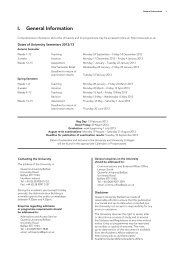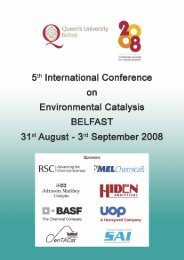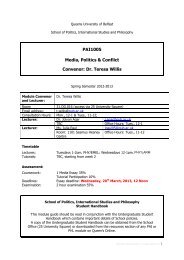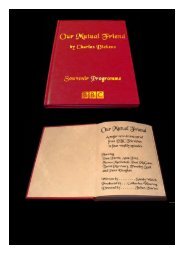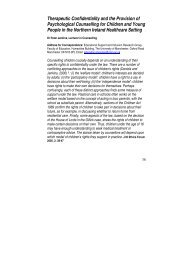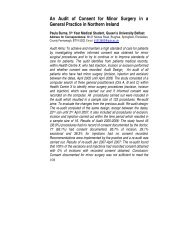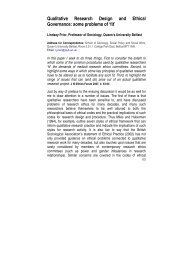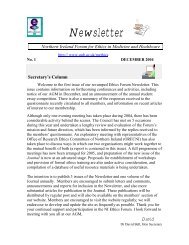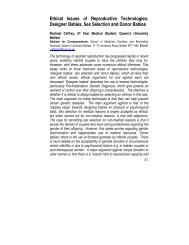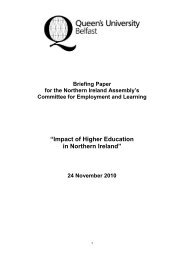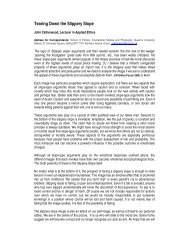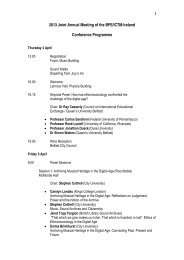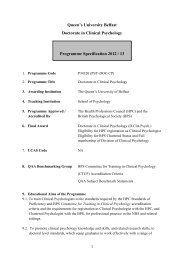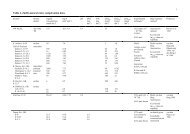MA brochure - Modern Poetry - Queen's University Belfast
MA brochure - Modern Poetry - Queen's University Belfast
MA brochure - Modern Poetry - Queen's University Belfast
You also want an ePaper? Increase the reach of your titles
YUMPU automatically turns print PDFs into web optimized ePapers that Google loves.
School of English<br />
Postgraduate Degrees in <strong>Poetry</strong>
Why <strong>Poetry</strong> at Queen’s?<br />
<strong>Poetry</strong> is intricately intertwined with the history of <br />
Queen’s <strong>University</strong> <strong>Belfast</strong>. The university has a <br />
proud tradition of nurturing creative and critical <br />
talents in the field of poetry. Nobel Laureate <br />
Seamus Heaney, a graduate of, and former lecturer <br />
at Queen’s was a founding member of the ‘<strong>Belfast</strong> <br />
Group’ in the 1960s, in which the early careers of <br />
other internationally renowned poets -‐ Paul <br />
Muldoon and Michael Longley among them – were <br />
forged, and in which poets engaged with leading <br />
critics of modern poetry, such as Philip Hobsbaum <br />
and Edna Longley. The tradition of the <strong>Belfast</strong> <br />
Group continues in the Seamus Heaney Centre for <br />
<strong>Poetry</strong>, and in the commitment it has to the <br />
interaction of creative and critical activity. <br />
Postgraduate students who choose to study <br />
<strong>Modern</strong> <strong>Poetry</strong> in the School of English at Queen’s <br />
will be joining an academic environment with a <br />
long-‐standing reputation for the critical <br />
appreciation, reception and understanding of <br />
poetry from Ireland, Britain and the United States. <br />
Poets who come to Queen’s to develop their own <br />
writing have the unique opportunity of working in <br />
the Seamus Heaney Centre with some of Ireland’s <br />
finest poets .<br />
Academic Environment<br />
The School of English, together with the Seamus <br />
Heaney Centre for <strong>Poetry</strong>, is the largest English <br />
department in Ireland with a dedicated and <br />
growing postgraduate student community. We are <br />
home to over 100 Masters and research students <br />
and host readings, lectures and seminars <br />
throughout the year.<br />
Together with the <strong>University</strong> of Dublin, <strong>University</strong> <br />
College Dublin, the Arts Council of Northern Ireland <br />
and An Chomhairle Ealaoin (Arts Council of <br />
Ireland), the School and the Heaney Centre c0-‐host <br />
the prestigious Ireland Chair of <strong>Poetry</strong> with the <br />
holder attached to each university in turn for a year <br />
at a time. Since its inception in 1998 the holders <br />
have been John Montague, Nuala Ní Dhomhnaill, <br />
Paul Durcan, and Michael Longley; the current <br />
Chair (2010-‐13) is Harry Clifton. <br />
Resources and Facilities<br />
The Seamus Heaney Centre for <strong>Poetry</strong> is an <br />
internationally recognized centre for the study as <br />
well as the production of poetry. A dynamic and <br />
vibrant focal point in Ireland for writing, for <br />
criticism, and for the appreciation of modern <br />
literature, the Seamus Heaney Centre for <strong>Poetry</strong> <br />
promotes an ethos of lively exchange between <br />
poets, critics and students under its Director, the <br />
internationally renowned poet Professor Ciaran <br />
Carson, and its assistant director, the critic Dr Fran <br />
Brearton. The poets and poet-‐critics Ms Medbh <br />
McGuckian, Dr Sinead Morrissey and Dr Leontia <br />
Flynn are based in the Centre, along with Professor <br />
Emerita Edna Longley, one of the leading critics of <br />
Irish poetry and literature, who continues to <br />
challenge and define the categories and canons of <br />
modern poetry. Critics of modern poetry in the <br />
School also include Professor Edward Larrissy, Dr <br />
Fran Brearton, Dr Philip McGowan, and Dr Gail <br />
McConnell.<br />
The Centre’s journal of contemporary writing, The <br />
Yellow Nib, is published twice a year. The Centre <br />
runs a programme of literary events fortnightly <br />
each semester enabling students to hear some of <br />
the finest writers of our time firsthand.<br />
The new McClay Library at Queen’s offers students <br />
world-‐leading facilities and research resources <br />
including extensive archival materials (Seamus <br />
Heaney’s Beowulf papers for example) and rare <br />
books in the field of modern Irish poetry. <br />
Postgraduate students have access to work and <br />
computing facilities in the School of English and <br />
the Seamus Heaney Centre for <strong>Poetry</strong> as well as in <br />
the Humanities Postgraduate Centre and the <br />
International and Postgraduate Student Centre, <br />
located opposite the McClay Library.
<strong>MA</strong> in <strong>Poetry</strong>: Creativity and Criticism<br />
Convenors: Dr Fran Brearton & Dr Sinead <br />
Morrissey<br />
Recognising that poetry is an art form <br />
encompassing both creative and critical thought, <br />
the <strong>MA</strong> in <strong>Poetry</strong>: Creativity and Criticism brings <br />
together these strands for the first time in one <strong>MA</strong> <br />
programme. Suitable for both poets and critics <br />
alike, the programme provides workshops and <br />
training for poets, alongside a critical grounding <br />
that facilitates further study of creative writing <br />
(poetry) at PhD level. It also provides specialist <br />
academic study for critics and scholars who wish to <br />
focus on the study of poetry, at <strong>MA</strong> level, and into <br />
PhD work, introducing students to the major <br />
poetry traditions of Ireland, Britain, and the US, in <br />
terms of their formal properties and their critical, <br />
social, intellectual and political contexts. <br />
Furthermore, the programme offers the unique <br />
opportunity for students to develop critical <br />
perspectives in collaboration with creative writers <br />
and vice versa. The <strong>MA</strong> in <strong>Poetry</strong> is taught by poets <br />
and critics of international reputation who write <br />
and publish extensively in the field of modern <br />
poetry – Prof. Ciaran Carson, Ms Medbh <br />
McGuckian, Dr Sinead Morrissey, Dr Leontia Flynn, <br />
Prof. Edward Larrissy, Dr Fran Brearton, and Dr <br />
Philip McGowan.<br />
Compulsory modules: semester 1:<br />
(1) Reading <strong>Poetry</strong>: inspired by the original <br />
‘<strong>Belfast</strong> Group’ workshops, attended by poets and <br />
critics, this module provides the opportunity for <br />
students to analyse and evaluate new and <br />
established writing (by themselves or others as <br />
appropriate) and in the process to engage with <br />
different approaches to the reading, writing, and <br />
analysis of poetry. The module therefore involves <br />
consideration of the poet-‐as-‐critic through study of <br />
critical writings by a range of British, Irish and <br />
American poets such as Yeats, Eliot, Auden, <br />
Stevens, Pound, Kavanagh, and Heaney, and of the <br />
poem itself as a vehicle for criticism.<br />
(2) Structure & Serendipity: Form in <strong>Poetry</strong>: A <br />
discussion and analysis of how poetic form in <br />
general is produced, this module introduces <br />
students to the form and language of poetry as <br />
well as the historical dimensions of, and contexts <br />
for, various poetic forms. It analyses poetic forms <br />
in detail, grounding students in specific poetic <br />
forms (e.g. the sonnet, the sestina, villanelle), <br />
reading a wide range of examples by different <br />
poets, with students engaging with a different set <br />
form each week.<br />
(3) Approaches to <strong>Poetry</strong>: craft, collections, <br />
contexts: Students, whether creatively or critically <br />
focused, research and discuss the different <br />
demands made on the work of the poet by a range <br />
of relevant archival, critical, and creative contexts. <br />
Awareness of a range of issues pertinent to the <br />
production of, and critical reaction to, poetry is <br />
developed through analyses of the format and <br />
production of a collection, the transition from <br />
manuscript to publication, processes of authorial <br />
revision, the anthologising of poems, the <br />
formation of creative and critical schools, and <br />
relevant critical and methodological contexts.<br />
[NB For the compulsory semester 1 modules, <br />
different assessment options are available (critical <br />
essay or poem-‐portfolio plus commentary) <br />
according to student interests.]<br />
Elective modules: semester 2<br />
A POETRY CRITICISM<br />
(1) British <strong>Poetry</strong> 1880-‐1990 – offering a close <br />
study of the work of British poets, beginning with <br />
Thomas Hardy and Edward Thomas, moving <br />
through the War poets, the ‘Movement’, and the <br />
more recent work of Harrison, Hill, Hughes and <br />
Duffy.
Miriam Gamble, <br />
poet and former <br />
PhD student, on <br />
why she chose the <br />
School of English at <br />
Queen’s<br />
“I had the time of my life studying <br />
poetry at Queen’s – critically and <br />
creatively, intellectually and socially <br />
(one and the same thing, which is <br />
unusual and precious). I came by <br />
accident, but it’s the best hand <br />
serendipity has ever dealt me. I wrote <br />
my first book of poems there, forged my <br />
best and most enduring friendships.”<br />
(2) American <strong>Poetry</strong>: from Dickinson to Olds – <br />
this module examines some of the main currents of <br />
American poetry from the close of the nineteenth <br />
century to the present day.<br />
(3) Irish <strong>Poetry</strong>: W.B. Yeats to the present: <br />
beginning with Yeats, this module explores the key <br />
figures and movements in Irish poetry through the <br />
twentieth and into the twenty-‐first century <br />
B. CREATIVE WRITING: POETRY<br />
(1) <strong>Poetry</strong> Workshops: a series of twelve weekly <br />
2-‐hour workshop to which students bring their <br />
poems to be discussed with the convenor and the <br />
other students. <br />
(2) The Long Poem: This six-‐week module will <br />
investigate the various formal and thematic <br />
possibilities of the contemporary long poem. <br />
Contemporary long poems by Alice Oswald, <br />
Stanley Moss, Leontia Flynn, James McMichael, <br />
Robert Pinksy and Paul Muldoon (among others) <br />
will be discussed in class with a view to analysing <br />
the contemporary long poem’s peculiar challenges <br />
and achievements. Students will be working on <br />
their own long poem throughout the module.<br />
(3) Poetics of Translation: The Poetics of <br />
Translation is a practical 6-‐week course in <br />
negotiating language. Students will be given a <br />
selection of poems from other languages, together <br />
with 'literal' translations and several versions by <br />
translators and poet/translators, and will discuss <br />
how these vary in their interpretation of the <br />
originals. Students will then produce their own <br />
translations, together with a commentary on the <br />
process. Knowledge of a second language is <br />
helpful, but by no means essential, since the <br />
exercise deals primarily with examining register <br />
and tone in the English language. "Translating from <br />
the Italian, Tuscan or Florentine, I found myself <br />
translating as much from English, or various <br />
Englishes." (Ciaran Carson, The Inferno of Dante <br />
Alighieri)<br />
Dissertation/Portfolio – compulsory 15,000 word <br />
independent research work on a topic developed <br />
from the taught modular coursework, completed <br />
by mid-‐September and overseen by a specified <br />
member of staff on the <strong>MA</strong>, or a portfolio of poems <br />
plus accompanying critical commentary supervised <br />
by a poet teaching on the <strong>MA</strong> programme.<br />
PhD in English, <strong>Modern</strong> <strong>Poetry</strong><br />
Doctoral research in <strong>Modern</strong> <strong>Poetry</strong> includes but is <br />
not restricted to the work of poets working in <br />
English from the early modern period to the <br />
present day.<br />
Recently completed doctoral theses:<br />
Towards a Supreme <strong>Poetry</strong>: The Ecstatic Self in the <br />
<strong>Poetry</strong> of Wallace Stevens and Sylvia Plath (2011)<br />
“For a word’s sake”: Theological Aesthetics in <br />
Contemporary Northern Irish <strong>Poetry</strong> (2010)<br />
The Seamus Heaney Digital Archive: The Public <br />
Performance of <strong>Poetry</strong> (2010)<br />
Urban Confetti: Benjamin, Carson, O’Hara and the <br />
Figure of the <strong>Modern</strong> Urban Poet (2009)<br />
Form, Genre and Lyric Subjectivity in Contemporary <br />
British and Irish <strong>Poetry</strong> (2008)
How to Apply and Funding<br />
Applicants should apply for a place on the relevant <br />
programme via the <strong>University</strong>’s online application <br />
system at -‐ https://dap.qub.ac.uk/portal/ -‐ and may <br />
do so until 3 June 2012 for September 2013 entry. <br />
Applications submitted between 2 March and 4 <br />
June 2013 will not be eligible to be considered for <br />
funding. The application requires a record of <br />
undergraduate academic results, a sample of <br />
written work, and two academic references. For <br />
students who wish to take creative writing <br />
assessment options in semester 1 and the poetry <br />
creative writing options in semester 2, the <br />
application requires a creative writing sample, plus <br />
good 2.1 Honours degree or equivalent recognised <br />
qualification. In certain circumstances, students <br />
may be admitted on the strength of their writing <br />
alone; however, these students would enrol initially <br />
for the PG Diploma, with the possibility of <br />
transferring to the <strong>MA</strong> at a later stage.<br />
Funding for September 2013 Entry<br />
Deadline for applications to be considered for <br />
funding: February 22nd 2013 <br />
The deadline for self-‐funding applicants is June 3rd, <br />
2013. <br />
The School of English commits a proportion of its <br />
annual budget to fund postgraduate taught and <br />
research students. Home and EU students are <br />
eligible for awards from the Arts & Humanities <br />
Research Council (AHRC) and Department for <br />
Employment & Learning (DEL). International <br />
students can avail of awards from the <strong>University</strong>, <br />
amongst other sources. <br />
General information about postgraduate study at <br />
<strong>Queen's</strong> is available at: http://www.qub.ac.uk/<br />
home/ProspectiveStudents/<br />
PostgraduateStudents/.
For further information, contact:<br />
Linda Drain<br />
Secretary, Postgraduate Education<br />
School of English<br />
2 <strong>University</strong> Square<br />
Queen’s School <strong>University</strong> of English <strong>Belfast</strong><br />
<strong>Belfast</strong><br />
BT7 1NN<br />
Queen’s <strong>University</strong> <strong>Belfast</strong><br />
<strong>Belfast</strong> BT7 1NN<br />
N. Ireland<br />
Tel: 028 9097 3320<br />
Fax: pgenglish@qub.ac.uk<br />
028 9097 3334<br />
Web: www.qub.ac.uk/english<br />
Email: pgenglish@qub.ac.uk<br />
http://www.qub.ac.uk/schools/SchoolofEnglish/ProspectiveStudents/<br />
N112666<br />
Design: www.darraghneely.com



